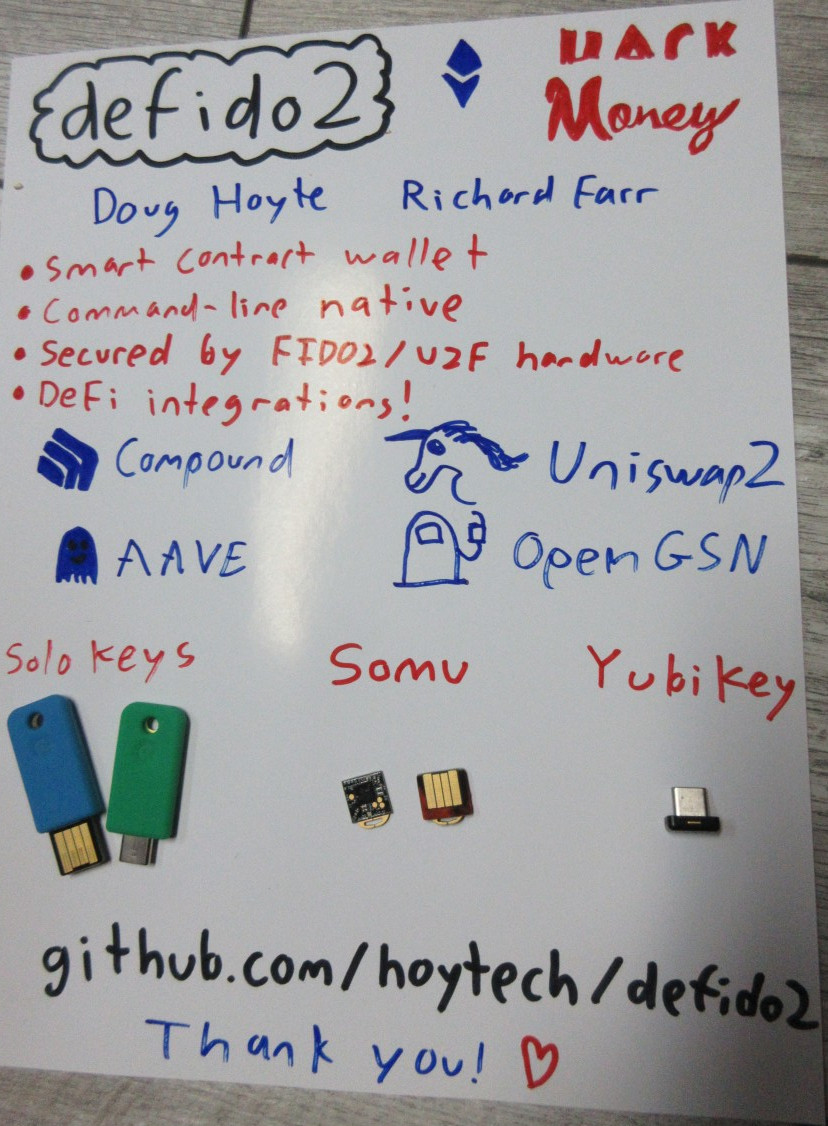defido2 is a command-line contract-based ethereum wallet intended for DeFi (decentralised finance) use-cases. The wallet's key material is stored on special-purpose tamper-resistant devices known as FIDO2 or U2F keys. All signature operations are performed on the key itself.
FIDO2 keys are cheap and common, since they are being heavily promoted by google/twitter/github/etc for webauthn, second-factor logins. Additionally, OpenSSH now supports FIDO2 devices for password-free logins.
defido2 uses libfido2, so it should support any CTAP2-capable FIDO2 device. We've tested with 2 models of YubiKey, Solo USB-C, and Solo SOMU. Solos can be purchased for $20 on their web store.
defido2 is a Log Periodic project.
Get pre-requisites:
git submodule update --init
sudo apt install -y build-essential libfido2-dev libssl-dev libdocopt-dev libgmp-dev libcbor-dev
npm i
## Download solc 0.6.x and put in path: https://github.com/ethereum/solidity/releases
Build:
make -j
You can fork mainnet for testing:
./node_modules/.bin/ganache-cli -f https://cloudflare-eth.com -i 999 -m 'relief drive intact sting lion law pizza scan ten genius carry timber'
Figure out which device your key is on:
$ ./defido2 list
/dev/hidraw1 - 4176:1031 (Yubico/YubiKey OTP+FIDO+CCID)
Init your defido2.json configuration file:
$ ./defido2 --device /dev/hidraw1 init
Enter PIN for /dev/hidraw1:
Initialized file defido2.json
- Note: After entering your pin, you will have to press your FIDO2 key, to activate the "user presence" detection.
Add a private key with some ETH, so you can pay gas (eventually gas could be paid by OpenGSN instead):
$ PRIVKEY=0xd6fe84b08cf89b2ae136196471c27ab02abddd85a306167065d90ce65ac2674b ./defido2 add-priv
Deploy your wallet:
$ ./defido2 deploy
Wallet deployed to 0xD1E86EA46C56758728eb95595699146250011e37
Send a transaction (permit uniswap to access your wallet's DAI):
$ ./defido2 erc20 approve dai uniswap
Enter PIN for /dev/hidraw1:
Invoking method to=0x6B175474E89094C44Da98b954EedeAC495271d0F value=0x0000000000000000000000000000000000000000000000000000000000000000 payload=0x095ea7b3000000000000000000000000f164fc0ec4e93095b804a4795bbe1e041497b92affffffffffffffffffffffffffffffffffffffffffffffffffffffffffffffff
Sent tx: 0x0b392d220de4ec1af0b74c2d745789f4e6ca2f9e56c5e01b2db4566257df6893
Tx mined in block 10131095 (0x95efeaaebb8b5b4beac06b39d78112689a44030ab1133da1973c85566897cbc9)
defido2 uses sub-commands, similar to how git does. You can run a sub-command to get its usage information:
$ ./defido2
Arguments did not match expected patterns
Usage: defido2 [--config=<config>] [--device=<device>] <command> [<args>...]
Options:
--config=<config> Config file (default defido2.json)
--device=<device> FIDO2 device (default /dev/hidraw1)
-h --help Show this screen.
--version Show version.
Commands:
list Lists available fido2 keys
init Inits a key
add-priv Adds an ethereum private key for sending transactions
deploy Deploy wallet
sign Signs a message
eth ETH operations
erc20 ERC20 operations
compound Compound operations
uniswap Uniswap operations
aave AAVE operations
- More DeFi integrations!
- Since FIDO2 uses secp256r1 signatures, they are expensive to verify within solidity. Each transaction uses about a million gas to verify the signature, which is very expensive and should be improved somehow.
- Currently we call out to javascript to do some of the JSON-RPC communication. Eventually we'll move the rest of this into C++ and use websockets to talk to the ethereum nodes (this is mostly done in another private project, just need to port it over).
- Finish support for resident keys, fix support for keys configured without PINs
- "Multi-sig" contracts so that you require multiple keys, or can have a back-up key in case you lose your main one

